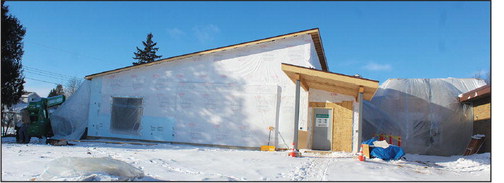Public comment period open on new Granton animal ordinance
After posting a copy of a new ordinance this month for public viewing and comments, residents in the village of Granton will have a chance to ask the village board for any changes they want considered for the new ordinance that will allow them to own certain farm animals and poultry/fowl within the village. The new ordinance was approved to be posted for public comments by the village board during its regular meeting Jan. 11.
The new ordinance is set to replace all prior ordinances related to regulations on farm animals and poultry/fowl. Two of those were listed by name within the new ordinance: Ordinance 17, which passed in 1939 and banned geese, ducks and other waterfowl from running at large; and Ordinance 63, which was an amendment added to Ordinance 17 in 1982 and banned all types of farm animals in the village.
According to the new ordinance, farm animals such as horses, sheep, cattle and goats will all be allowed to live within the village as long as the animals are properly housed and cared for without being a nuisance or unsanitary to others. Anyone bringing an animal into the village will have to register their animal with the village clerk and pay annual fees to keep them there.
The exact number of animals allowed per household in the village is dependent on its type and the size of property owned by the resident. According to the ordinance, animals classified as “farm animals” such as horses, cattle, sheep and goats are allowed at an amount of one animal per acre for any resident who owns 1.5 acres or more, with a maximum of 10 animals. Animals classified as “poultry/ fowl” are allowed at an amount of four animals maximum for any property owner who owns less than 1.5 acres. For those who own 1.5 acres or more, poultry/fowl are allowed at five animals per acre with the maximum limit set at 15 animals.
The ordinance includes a short list of animals that are not allowed within the village. Buffalo, elk, emu, alpacas and swine are not permitted, nor are any intact males of any kind, including roosters. For any animals that fall outside of the ordinance, the board will allow a resident to come and request to have their animal approved.
In addition to listing animals, the new ordinance also includes rules on what housing and maintenance is required to keep the animals in the village. The shelter must be structurally sound and maintained, with plenty of space and fencing. Animals are not allowed to be free-range, located in the front of the property or within 30 feet of a house or occupied building. For animals that will only temporarily reside in the village -- in cases such as 4-H or county fair projects -- temporary housing and fencing are required.
Farm animals that are allowed in the village are also expected to be cared for, with clean water, bedding and sufficient food to keep them healthy. The area where they live is also expected to be cleaned and maintained regularly to avoid the spread of disease or infestation by rodents and insects and to control smell. The board also said the new ordinance would not allow any farm animal to be butchered or slaughtered in the village, but made sure to note that deer harvested during hunting season do not fall under the rules of the ordinance.
The cost to have a farm animal in the village will be charged on an annual basis, except in the cases of 4-H or county fair projects, which are not subject to fees as long as they are in the village for 120 days in a year or less and have been proven by the owner to be in the village for that purpose.
The fees in the ordinance were set to: cattle and horses, $20 per animal; sheep and goats, $10 per animal; other permitted medium/large animals, $10 per animal; chickens, geese and ducks, $5 per animal; and any other small permitted animals, $5.
Any resident caught violating the rules set by the new ordinance could face penalties such as a verbal warning, fines between $50-$500 and restitution for any damages caused by the animal in question, loss of license and/or removal from the village.
The new ordinance will be printed and posted for viewing for the next month and will be revisited for approval at the Feb. 8 regular village board meeting.
Also on Jan. 11, the village held a caucus to decide the candidates for the upcoming spring election. Seats up for election are for village president, currently held by Tom Gorst; and for trustee, currently held by Megan Naedler. For president, Tom Gorst and John Garbisch were nominated, while Naedler declined to seek another term. Nominated instead for the seat of trustee were Troy Moen and Tyler Montie.
Reporter Cheyenne Thomas contributed to this report.


